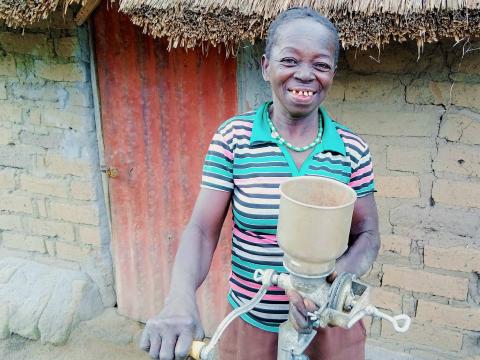Fish farming and peanut paste production thrive, thanks to South Sudan's enterprising women

“We earned substantial income from our livelihood last month enabling us to take care of our household needs,” says 49-year old mother Rigideevuru Victoria. This hardworking mother has set a good example in her community that they can all rise from hunger if they learn and work together.
From the livelihood group’s income, last month amounting to SSP130,000 ($844) Victoria shares proudly, “I used my share of the income to construct a grass thatched house for my children so we are safe from thieves and bad weather, even the cold season.”

She was also able to buy a peanut paste-grinding machine and a plastic drum needed for her small business. Peanut paste is in good demand in South Sudan as people regularly use it for daily meal mixed with vegetables.
“The machine will conveniently allow me to produce the peanut paste from home instead of doing it in the market. I can sell it daily and earn more income. The drum is necessary to process cassava flour in big quantity that I can sell”, further explains Victoria.

In 2018, Victoria was among the people chosen to be part of the cash-for-assets program funded by the World Food Program in Western Equatoria Zone. The project targeted food insecure households while helping them create the assets in the community for livelihood.
Many of the people have entrepreneurial skills and were even resourceful enough to set-up fish ponds to support their families without any external assistance. The program just enhanced what they were doing by improving their skills and marketing process.

“Women play a big role in ensuring not only their family’s welfare but their children’s well-being as well, which is what World Vision’s programs aim to contribute to. Our assistance to women in their livelihoods efforts is important in helping them adequately take care of their children and families”, says Enid Ocaya, World Vision’s Zonal Program Manager in Western Equatoria Zone.
When the COVID-19 lockdown is over, I will be ready to support my grandchildren’s education with the savings from both the sales of fish and other farm products.
Currently, Victoria leads the Nazeretha women’s group with 17 community members, helping motivate them as their fish farming venture flourishes. She recalls, “The group started with three fishponds in 2018. In 2020, we proudly have established nine fishponds fully stocked with fingerlings.”
Each of the nine fishponds has a size of 15m x 20m and the growth has impressed the whole community. The group sells the fingerlings to interested fishermen who wants to improve their own fishponds and supplies fish to private traders.

Victoria expressed her gratitude to World Vision and the WFP for supporting their community initiative project. “During the conflict, I was discouraged by the loss of my properties but the project has helped me stand up and transform my family’s life again”, Victoria adds.
She is hopeful of the future. “When the COVID-19 lockdown is over, I will be ready to support my grandchildren’s education with the savings from both the sales of fish and other farm products", she says.

The project assisted 188 households that established fishponds in Yambio and Nzara Counties. With World Vision's and the women's group's efforts combined, 18 fishponds were established providing food security and steady income to families.
Ocaya concludes, “World Vision supports these hardworking women take care of their children. This is what brings joy to them and contributes to development of their communities at large.”
Related Video: South Sudan's fishing industry has a huge livelihood potential
Story by Victor Diko, Food Assistance, Monitoring & Evaluation Officer I Photos by Wamite Luke, Project Officer